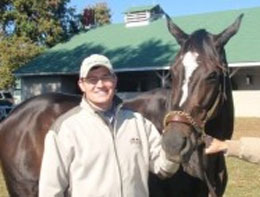- News
- Horse Racing
- Racing Preview
- AQHA Racing Challenge
- Breeding
- Sales
- Quick Stakes Results
- Detail Race Results
- Qualifiers
- Leader Board
- Leading Sires
- Videos
- Auction Leaders
- Q-Racing
Streaming Video

Republished from the PAULICK REPORT
by Ray Paulick
OCTOBER 23, 2014—Saying he is a veterinarian “whose ethical compass is broken” and who “embodies the worst stereotypes of a racetrack practitioner,” the Indiana Horse Racing Commission has filed an administrative complaint against Dr. Ross Russell, recommending a 20-year suspension and $20,000 fine for allegedly breaking numerous IHRC medication rules. Joe Gorajec, executive director of the Indiana Horse Racing Commission, has used his authority to immediately exclude Russell from all premises under the direction of the commission.
Russell, a 31-year-old graduate of Michigan State University’s College of Veterinary Medicine and the son of trainer Randall Russell, was summarily suspended in September after a security worker said she saw him inject a horse with a substance other than Lasix on race-day. Only Lasix is permitted on race-day in Indiana. The exclusion associated with the administrative complaint makes that summary suspension superfluous.
An executive summary of the Oct. 23 complaint states that Russell “is willing, if not eager, to knowingly dispense unauthorized drugs and loaded syringes for illicit race-day administration. He will take extraordinary steps to protect his practice – no matter how unethical. Dr. Russell has had treatment records and billing statements altered. He has ineptly attempted to blame a former employee for his wrongdoing. In addition, he has lied to commission staff multiple times during the course of its investigation.”
The complaint says Russell on multiple occasions has furnished horsemen with injectable bottles and loaded syringes, including ACTH (adrenocorticotropic hormone), Sarapin, P-Block, and Solu-Cortef. He has allegedly used substances prohibited by the Indiana Horse Racing Commission, including Stop Two and Arnica (ARC) and is accused of giving cobalt to horses, suggesting it “makes them run like a beast.” Trainers Ron Raper and Wayne Mogge provided details on some of Russell’s activities during interviews with Holly Newell, deputy counsel of the Indiana Horse Racing Commission. So did Dr. Libby Rees, who worked for the veterinarian’s Russell Equine Sports Medicine at Indiana Downs from April 1, 2014, until Aug. 14.
In a sworn affidavit provided to the commission, Rees said she was instructed during her employment by Russell to deliver injectable bottles and loaded syringes for several trainers, including Ron Raper and Mike Norris. “Dr. Russell instructed me to stand on the toilet in trainer Norris’ bathroom, and leave a syringe on the ledge to the right,” Rees said. “At Dr. Russell’s instruction, I did leave an unopened injectable bottle of dexamethasone for trainer Norris in his tack room at Indiana Grand.”
Rees also said Russell gave cobalt to horses. “Dr Russell administered cobalt through a jug, adding 3 mL of a product called 20 percent blood builder, or 50 mL of a product referred to as a red cell shot,” she told the commission. Russell instructed her not to write “cobalt” on day sheets that recorded any medication treatments, Rees said, to instead call them “Vitamin Plus Jug” and bill clients $100. “Dr. Russell told me cobalt ‘makes them run like beasts, but you only get two or three good races out of them, and then they’re done,” Rees told the commission, admitting that she administered cobalt at Russell’s instruction.
“At the instruction of Dr. Russell, I administered a jug that contained a red cell shot, to a horse named (redacted). While (redacted) was receiving the red cell shot, she had an adverse reaction. (Redacted)’s heart rate increased significantly. (Redacted) struggled for breath, as indicated by her flaring nostrils and respiration
rate. (Redacted)’s rate of respiration increased to about 35 breaths per minute. A horse’s normal respiration rate should be about eight to 12 breaths per minute. (Redacted)’s entire body sweated profusely.
“As I observed (redacted)’s adverse reaction to the jug, I was very alarmed and concerned that the horse would die,” Rees continued. “(Redacted)’s reaction lasted about three to five minutes. Every horse that I have observed receiving a jug containing a cobalt product, has had a similar reaction, but sometimes to a lesser degree.
“I discontinued using Vitamin Plus Jugs after observing (redacted)’s adverse reaction to the substance.” When the Indiana Horse Racing Commission began testing for cobalt to determine how widely it was being used and prior to rules being promulgated to regulate it, six horses tested with extremely high levels of the substance. All six were from trainers who were clients of Russell Equine Sports Medicine.
The complaint cites an example of a horse that was tested twice for cobalt, with widely different results. In a race from which it was claimed, the horse tested for 18.6 parts per billion of cobalt (under the 25 ppb threshold that was later adopted). It ran back for a new trainer and was treated by Russell two days earlier with a “bit Jug ++” noted on its treatment sheet. The horse won and tested for 1,127.0 ppb. The commission noted giving cobalt to a horse was not a rule violation at that time.
The administrative complaint also focuses on incomplete or non-existent treatment records that the commission calls “gross negligence” on Russell’s part. “Even more egregious are the numerous attempts to cover up his on-track drug violations with bogus bookkeeping entries,” the complaint says, identifying “several intentional deceitful acts designed to mask the true nature of Dr. Russell’s on-track activities.” Reached by telephone, Russell said, “I can’t comment because I have not looked at the complaint.” He has 20 days to request a hearing.

 Newsletters
Newsletters Facebook
Facebook